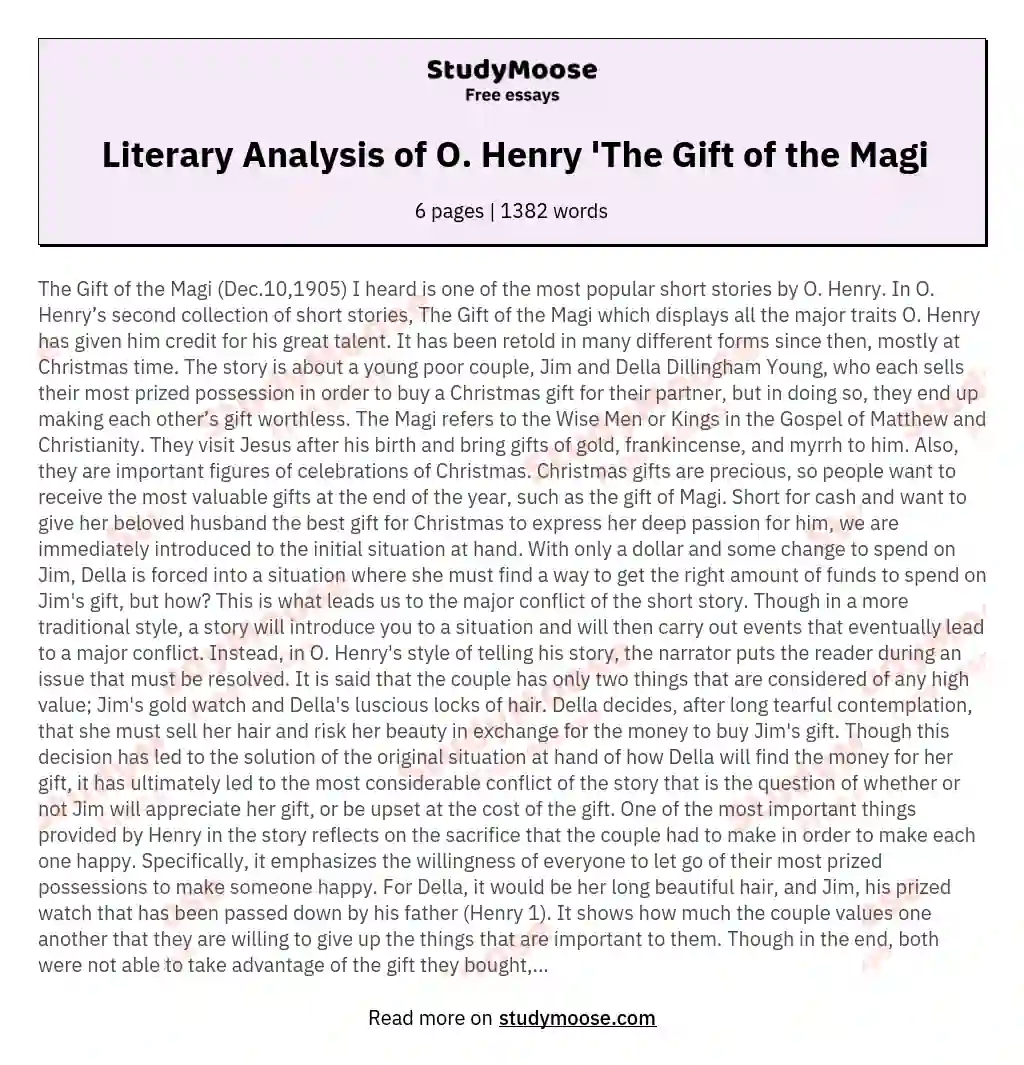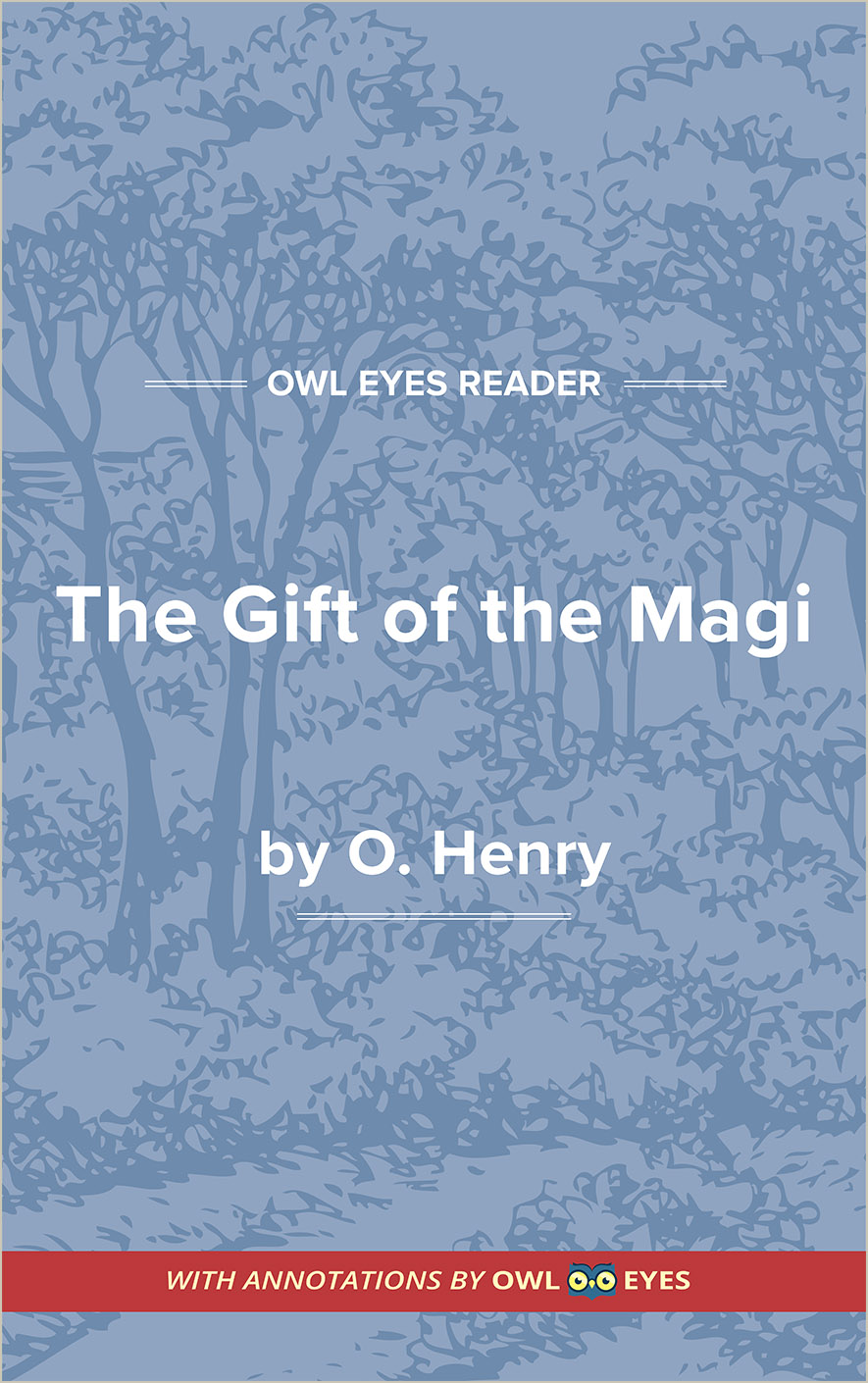Theme Of Gift Of The Magi
Theme Of Gift Of The Magi - The Gift of the Magi' is a short story from the United States. His stories are characterized by their irony, their conversational narrative style, their occasional sentimentality and their surprising twist endings. All of these things have become something of a signature feature, and 'The Gift of the Magi' encapsulates them all to some extent.

Theme Of Gift Of The Magi
But what does this Christmas story mean? You can read 'The Gift of the Magi' here before continuing our summary and analysis of O. Henry's story below. We discuss some of the main themes of 'The Gift of the Magi' in a separate post. It's Christmas Eve.
Jim and Della are a married couple living in a modestly furnished apartment in New York. They have little money. The story opens with Della upset because she only has one dollar and eighty-seven cents to spend on a Christmas present for her husband. The narrator tells us that the married couple each have a property in which they are very proud.
For Jim, it's a gold watch that belonged to his father and before that his grandfather. Della's prized possession is her beautiful hair. Della goes to a woman who deals in hair products. The woman agrees to buy Della's hair for twenty dollars. With the new buyer's money, Della goes to buy a platinum fob chain for Jim's gold watch.
Your Password Reset Email Should Arrive Shortly.
This cost her twenty-one dollars, leaving her with only eighty-seven cents in the whole world. When she gets home, she starts twisting what's left of her hair to make it look presentable. When Jim arrives home, he is surprised by his wife's behavior, but when she explains why she cut it, he hugs her and gives her the gift he bought her: two bark combs.
Source: us-static.z-dn.net
a turtle with jewelry that she had been admiring in a shop. Window. The combs are useless to her until her hair grows back, but at least she can give Jim his gift... But in a final twist, Jim tells Della that he sold his gold watch to pay for
expensive soles he bought her. . So now, she has two combs but no hair to use them on, and he has a platinum fob chain for a gold watch he no longer owns. Many of O. Henry's short stories - the majority of which extend to only five or six pages - are marked by their ironic twist, and "The Poison of the Magi" is a good example of this characteristic.
typical of his work. In their attempts to buy each other the Christmas gifts of their dreams, young Jim and Della end up sacrificing the things their gifts were meant to complement: the combs for the hair (sold) of ' Della and the chain for Jim's (sold) watch.
Something Went Wrong
As the narrator observes in the last paragraph: The wise men, as you know, were wise men - wonderful wise men - who brought gifts to the baby in the cuff. They invented the art of giving Christmas presents. Being wise, their gifts were undoubtedly wise, possibly with the merit of exchange in case of duplication.
And here I gave the unusual chronicle of two foolish children in an apartment, who most incomprehensible sacrificed for each other the greatest treasures of their home. But O Henry is not inviting us to laugh at their stupidity, but to celebrate their sacrifice. Indeed, what moved them was not stupidity, but wisdom, as the narrator noted in the last words of the story: But in a final word to the wise men of these days, it should be said that from
 Source: studymoose.com
Source: studymoose.com
all those who give gifts These two were the wise men. Of all those who give and receive gifts, such as are the wisest. Everywhere they are the smartest. They are the Magi. So there are, in a sense, two surprise twists at the end of 'The Magician's Gift': the trademark plot twist that characterizes most of O. The short stories
of Henry, and the narrative 'twist' in which he subverts our initial response – which might be to laugh heartily at the unfortunate turn of events just recounted – and makes a moral point that Jim and Della acted Wisely, although they ended up with 'free' gifts from each other.
The Interconnectedness Of Poverty And Shame
This is all well and good, but it should be noted that the narrator does not understand why he believes that Jim and Della were 'wise' of each gift. Obviously, 'wise' here is suggested by the Magi, the Zoroastrian astrologers who, in the Gospel of Matthew, visited the jewel Jesus and brought him gifts of gold, frankincense, and myrrh: hence the title of the story.
But what makes Jim and Della smart? And why doesn't Au Henry tell us? Was it because he wanted us to understand our minds, or did he assume that the answer was pretty much self-explanatory? The latter seems more likely. Definitely the 'moral' of 'The Gift of the Magi', given the Christmas setting and the fact that Jim and Della clearly love each other and treat each other well even though they don't have
money to afford the finer things in life, is that Love is more important than possessions. And when it comes to Christmas and buying gifts for our loved ones, it's really the thought that counts. But there is a bit more to 'The Gift of the Magi' than this old saying, which reduces the story to a sentimental and rather twee band about 'giving is better than receiving' and 'love is more important than
 Source: owl-static.enotescdn.net
Source: owl-static.enotescdn.net
money'. . Both of these statements are relevant to the story, but what is also relevant is the element of sacrifice that both characters make, and their reaction to learning the implications of this. So Jim is happy to part with a gold watch that has been passed down through the male line for three generations, while Della is happy to lose her hair (which, despite her protests, would take many months to grow back completely) to buy a
The Interconnectedness Of Poverty And Shame
a gift. that the other wants. But with the twist of history, they learn that their personal sacrifices - committed to their love for others - are in vain. But they are happy about this, not because of the gesture of buying the gift, but the great price it took for others.
Love, O Henry means to say, is about giving what you treasure most to show your beloved - whom you should love even more - the extent of your devotion. In other words, what is remarkable about 'The Gift of the Magi' is that its moral seems to be not only 'giving is better than receiving' but 'giving and losing is all that matters', because what
take is nothing practical. use.. Use for them. Enter your email address to subscribe to this site and receive notifications of new posts by email. Interesting Literature is a participant in the Amazon EU Associates Program, an affiliate advertising program designed to provide a means for sites to earn advertising fees by linking to Amazon.co.uk.
If you don't see it, please check your spam folder. Sometimes it can end there. If you don't see it, please check your spam folder. Sometimes it can end there. By signing up you agree to our terms and privacy policy. Don't have an account?
gift of the magi analysis, gift of the magi movie, the gift of the magi activities, gift of the magi study guide, the gift of the magi summary, gift of the magi printable, the gift of the magi pdf, the gift of the magi answer key